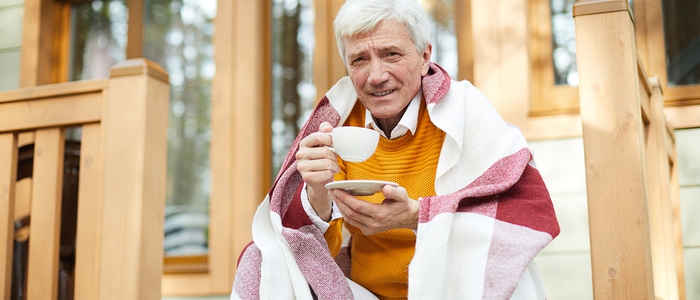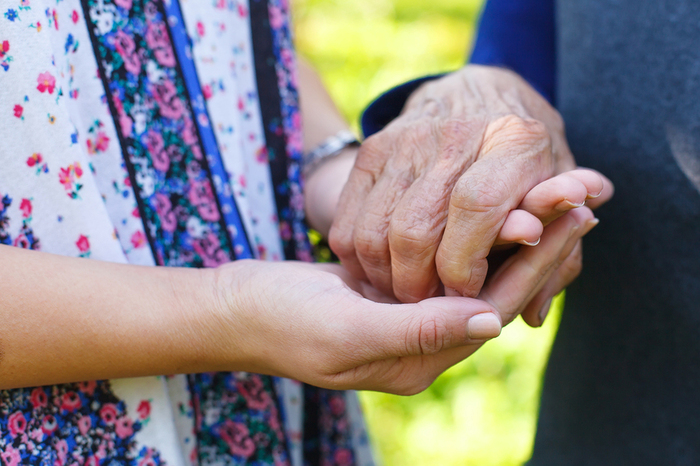
Nearly half of people (49.6 percent) of people aged 65 years and older have reported doctor-diagnosed arthritis, according to the CDC. As many as 25 percent of adults with the condition, meanwhile, say it causes them “severe pain.” Caring for someone with debilitating pain from one of the 100 forms of arthritis and its related diseases can be challenging. However, there are some things caregivers can do to bring aging loved one's relief. Read on for a roundup of seven tips aimed at helping minimize pain and maximize quality of life for people with arthritis.
1. Use heat.
Heat is not only soothing for aching joints; it also stimulates circulation and calms muscle spasms. Make sure your aging loved one is warm with added layers over vulnerable areas, such as the legs. Additionally, warm baths, heating pads, air-activated wraps and patches, and blankets can offer extra relief.
2. Encourage exercise.
Seniors often experience increased arthritis pain during the bone-chilling winter months. At the same time, we know that exercise can help reduce stiffness, promote blood flow, and improve flexibility. When going outside isn’t an option, encouraging seniors to participate in indoor exercise can give them both a physical and mental boost.
An added bonus? Because people with arthritis are at greater risk for falls and broken bones, keeping arthritic joints nimble through exercise can also be a preventative measure against falls.
3. Talk to a healthcare professional.
Certain supplements, including omega-3 fatty acids, are known to reduce inflammation. Talk to your aging loved one’s physician about whether adding fish oil and/or other vitamins and supplements to his/her diet can help manage the condition.
Paying attention to your loved one’s pain and symptoms, as well as nothing any activities which are particularly difficult for them, can help the doctor identify any potential underlying problems.
Additionally, a medical professional may also recommend other treatments, ranging from homeopathic methods to surgery.
4. Try massage.
Massage can help warm up and relax arthritic body parts. It can even help seniors wind down at night and sleep better! Keep in mind that even gentle massage can hurt; heat, lotions, and oils can be used to lessen the pain. Research psychologist Tiffany Field, PhD., told the Arthritis Foundation of the value of this natural technique, "Massage can result in a significant reduction in pain."
5. Promote healthy eating.
Extra weight puts extra pressure on the joints. Helping seniors make healthier choices at mealtimes can help them lose weight and feel better while alleviating arthritis pain. And while no food is a cure-all for arthritis, some types of food can help the body defend against arthritis pain. For example, foods that are high in calcium promote bone strength, which also leads to stronger joints.
Hydration can also keep symptoms of arthritis at bay. (Avoiding alcohol is also recommended, as alcoholic drinks can lead to dehydration.)
Lastly, keeping a good diary can help seniors note whether certain foods aggravate their symptoms. Sharing this diary with the doctor, meanwhile, can help him/her determine any nutrient deficiencies.
6. Arrange for help with daily tasks.
In some cases, arthritis pain can interfere with a senior’s ability to perform everyday tasks. Helping them with dressing, bathing, food preparation, cooking, and other everyday activities can prevent flare-ups. Remote caregivers can help from afar by arranging for home care.

7. Support social interactions.
Living with any chronic health condition can be demoralizing. Making sure that seniors have plenty of opportunities for socialization can help divert focus from the pain. When people are happier, their bodies release more of the feel-good hormone dopamine. So while seniors may not feel up to the task of socializing, it’s very good for them.
One last thing to keep in mind? Despite your best efforts, your aging loved one may still suffer from arthritis pain. Never underestimate the power of understanding and empathy for helping someone in your care feel better.
mmLearn.org offers a large library of free videos for caregivers of older adults, covering topics pertaining to senior care, including chronic pain management. Whether you are a healthcare professional or a family caregiver, if you are caring for an older adult we know that you will find mmLearn.org an essential learning and guidance tool for all of your caregiver training needs. For more free caregiver training resources, access our free online caregiver video library today.

